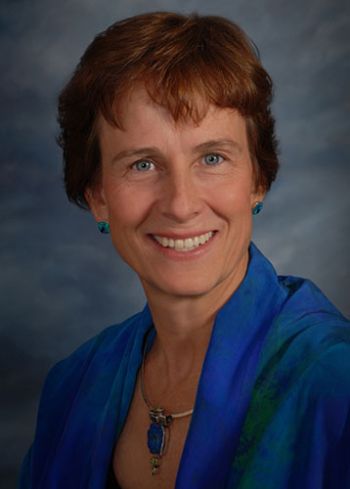
Medical and spiritual leaders, including George Washington University (GW) Institute for Spirituality and Health (GWish) Director Christina Puchalski, MD ’94, FACP, FAAHPM, convened in Rome this spring with the commitment to growing patients’ rights to palliative care worldwide.
Puchalski, professor of medicine at the GW School of Medicine and Health Sciences, attended two separate meetings during her trip to Italy. One was held by the Maruzza Foundation, during which participants from major religions ratified and signed the “Religions of the World Charter on Palliative Care for Older People.” Another meeting, held by the Pontifical Academy for Life (PAV), invited experts in medicine and spiritual care to discuss and study the growth and expansion of palliative care around the world.
Puchalski was a key member at the table during at the Maruzza Foundation event on March 30, “Religions Together for Palliative Care.” The meeting included four roundtables covering topics including religions and spirituality, clinical table, human rights, and patients and families.
Puchalski spoke on the religions and spirituality roundtable, tasking the experts attending with defining the relationship between the two; defining contribution religions can make to ensure that older people approaching the end of life and their families are supported in the midst of their suffering; and outlining how the charter can be used to have the maximum effect.
“It was a very inspiring group for me to work with, because we just seemed to flow,” Puchalski said. “There was a common language; everyone was committed to alleviating the suffering of people.”
Key members at that meeting included Monsignor Vincenzo Paglia, president of PAV, and Silvia Lefebvre D’Ovidio, of the Maruzza Foundation.
The next day at the Vatican, the Pontifical Academy for Life’s (PAV) International Advisory Working Group (PAL-LIFE) held a meeting for the PAL-LIFE Project, which will address diffusion and development of palliative care throughout the world.
At the two-day meeting, from March 31 to April 1, global experts spoke about challenges and opportunities to advancing palliative care. One of the greatest obstacles to the creation of palliative care programs worldwide is the lack of awareness of their existence and true purpose, Puchalski noted.
“I am incredibly honored to be part of this, and I am very excited to have had the opportunity to be with people who are likeminded in this work,” she said of the PAL-LIFE meeting. “It was great to be with a group of people who agreed that spiritual care is essential and attending to suffering is what this is all about.”
In the wake of that meeting, Puchalski is working with attendees on a white paper that will include detailed, actionable plans for advancement and education of palliative care.
“Part of … our passion at GWish is to help people around the world who are suffering from spiritual or existential distress,” she said, adding that now is the time to take action and ensure proper care for an aging population worldwide. The number of people 65 or older is projected to grow to nearly 1.5 billion by 2050, with most of the increase in developing countries, according to the World Health Organization.
In addition to her work with PAL-LIFE and the Maruzza Foundation, Puchalski is part of an important effort by the American Society for Clinical Oncology to develop guidelines for palliative care in clinical oncology globally.


